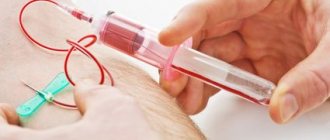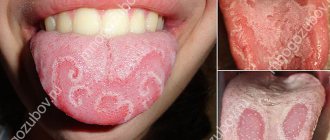Symptoms of herpes simplex infection
There are few signs of herpes, but they are all very characteristic. Therefore, difficulties in differential diagnosis almost never arise.
The main symptoms of infection with herpes simplex, which is the most common form of herpetic lesions, are as follows:
- painful tissue swelling appears in the affected area;
- after 1-2 days it transforms into a denser infiltrate;
- the infiltrate turns into a bubble with liquid;
- the blister bursts and a painful ulcer forms in its place;
- the ulceration dries out and is covered with a new layer of epithelium - the wound heals.
The way lips look after herpes is the same as after any other skin disease: the swelling disappears, but the ulcer cannot heal for some time. It is covered with a yellowish film that constantly “peels off” from the wound surface, thereby exposing the wound and delaying the process of epithelial regeneration at the site of the lesion.
Prevention
The secrets of prevention, how to get rid of constantly appearing herpes on the lips and reduce the possibility of its recurrence, are quite simple:
- according to all the rules, cure fresh herpetic rashes using antiviral and drying ointments;
- strengthen the immune system with the help of immunomodulators, vitamin therapy;
- Do not touch shared utensils with your lips without treating them additionally.
If your partner has herpes, personal relationships also need to be adjusted to preventive measures - in other words, avoid kissing (not only on the affected lips, but also on intimate places where genital herpes can develop. Even if the herpes “only popped up” on the lips – it is possible that the pathogen may be on the mucous membrane of the genital organs, although their morphological changes have not yet been observed).
Knowing how the herpes virus type 6 is transmitted in children (and it is transmitted through breastfeeding and through saliva, most often from the mother), it can be prevented as follows:
- if you suspect you have a disease, do not kiss your child;
- do not give water to your child from your own mug;
- stop breastfeeding;
- Do not “clean” a baby’s dropped pacifier or pacifier in a quick way by sucking it in your mouth (an archaic method that, nevertheless, for some reason has taken root among mothers).
Related services: Consultation with a dermatologist Dermatovenereology
Diagnosis of the disease
Herpetic blisters look so characteristic that they cannot be confused with the morphological signs of other diseases - neither with an abscess, nor with specific ulcerations, nor with an allergic rash. In the vast majority of cases, the diagnosis is made on the basis of clinical manifestations.
A blood test for antibodies to the herpes simplex virus is an indirect method of identifying the pathogen in the body. It can be used if the body’s reactivity (the intensity of the response to external harmful agents) is low, and the infiltrate does not develop into characteristic blisters, which raises the question among clinicians: is it herpes?
Herpes simplex, which is manifested purely by a rash on the face, should be distinguished from herpes type 6, which is characterized not only by a rash, but also by a sharp increase in temperature.
Is herpes contagious? Should I now avoid kissing and sex if I have a flare-up?
Herpes is contagious and spreads from person to person. But in general, there is nothing wrong with this - the disease is not dangerous for most healthy people.
If you are afraid of infecting your partner with herpes or becoming infected yourself, always use a condom during vaginal, oral and anal sex. And during cunnilingus, create a barrier between the mucous membranes of the mouth and genitals using a special latex napkin - a rubber dam. But remember, such protection still does not provide a 100% guarantee that you will not become infected.
If you do not want to use a condom, and your relationship with your partner is long and monogamous, then a healthy partner can take a course of antiviral drugs to prevent the disease. This is advice from the Herpes Virus Association. In this way, you can reduce the risk of transmitting herpes, but you need to consult a general practitioner about treatment. He will tell you which pills to take, for how long and in what dosage.
During the period of exacerbation of herpes, it is better to avoid sex and close contacts. As soon as you have a burning and tingling sensation on your lips, blisters around your mouth or on your genitals, the virus is in an active reproduction phase. From now on until the rash and crusts disappear, it is better to refrain from close contact.
Are herpes on the lips and genitals the same thing?
Sometimes yes and sometimes no.
There are two types of herpes simplex virus: HSV 1 and HSV 2. Conventionally, it is believed that the first type affects the lips and skin around the mouth, and the second type affects the skin and mucous membranes of the genitals. In fact, HSV 1 can appear on the genitals and anal area, and HSV type 2 can appear on the lips. Therefore, doctors prefer not to divide the herpes simplex virus into types, but to determine the disease by the location of the lesion.
The main thing is not to confuse the herpes simplex virus with its other relatives. Because there are 8 types of herpes viruses in total. The first two types cause the very herpes we are talking about, the others are called differently. For example, type 3 virus causes chickenpox, type 4 virus causes mononucleosis, type 5 causes cytomegalovirus infection, and the other three types have not yet been sufficiently studied and it is unknown how exactly they affect the body.









